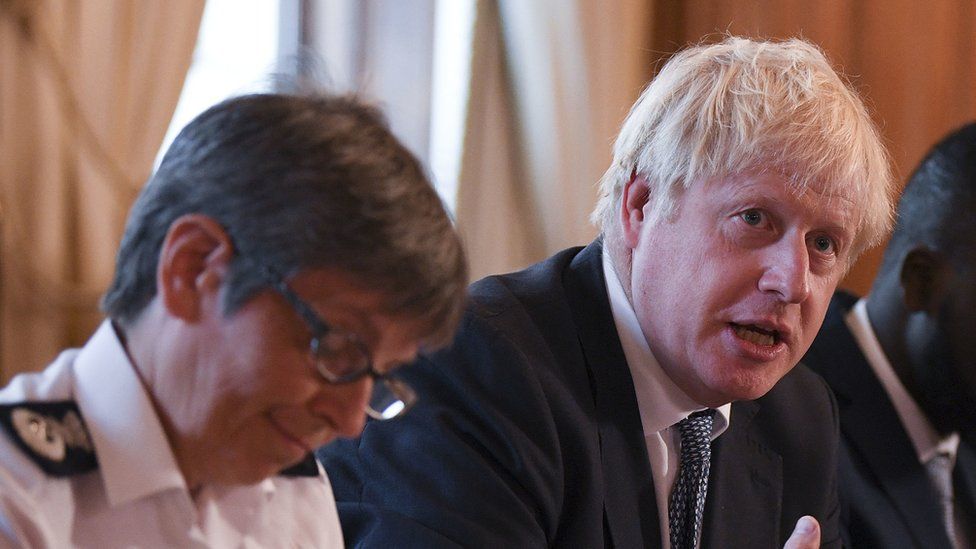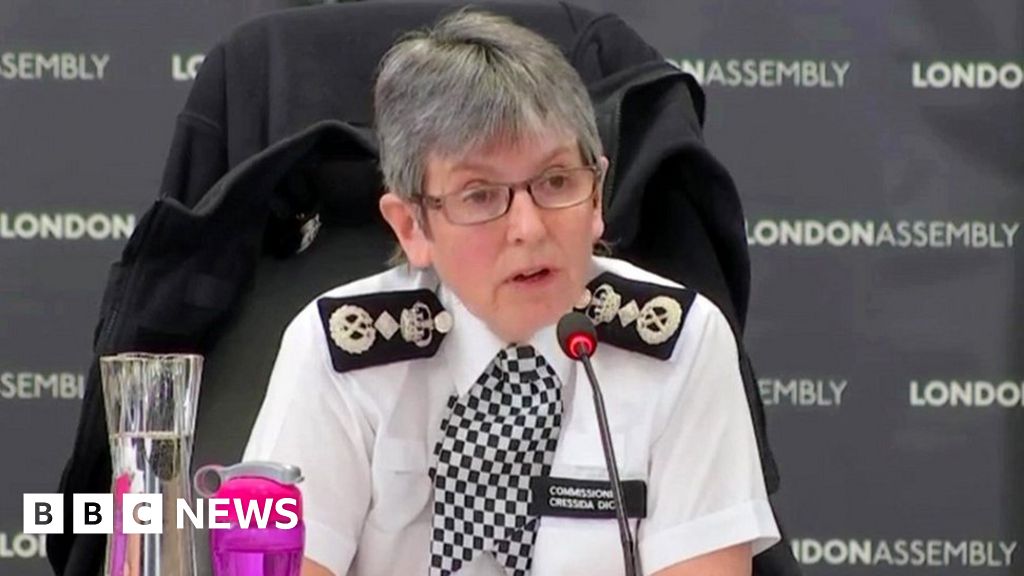This video can not be played
To play this video you need to enable JavaScript in your browser.
The Metropolitan Police have launched an investigation into parties held in No 10 during the coronavirus pandemic.
Commissioner Cressida Dick said they were looking into “potential breaches of Covid-19 regulations” in Downing Street and Whitehall since 2020.
Boris Johnson told the Commons he welcomed the investigation as it would “give the public the clarity it needs” over the allegations.
His spokesman also said the PM did not believe he had broken the law.
Dame Cressida said the investigation was launched after the Cabinet Office inquiry team, led by civil servant Sue Gray, passed information to the force.
It remains unclear whether the Met probe will delay the publication of Ms Gray’s report, which had been expected this week.
Earlier, the PM’s spokesman said parts of her inquiry would not be published until after the police investigation is completed.
But Downing Street later said talks about what is “suitable to publish” were still ongoing.
BBC political editor Laura Kuenssberg said the Met seem to have no objection to the full report being published, meaning it may be published sooner rather than later.
Dame Cressida would not say which parties were being investigated by the force, and while breaches of regulations can result in fixed penalty notices, the police inquiry did not mean they would be issued “in every instance and to every person involved”.
Labour deputy leader Angela Rayner renewed calls for Mr Johnson to resign in light of the inquiry, calling him a “national distraction”.
Asking an urgent question in the Commons, she said “potential criminality has been found in Downing Street”, and that the need for a police investigation into No 10 parties was “a truly damning reflection on our nation’s very highest office”.
But Paymaster General Michael Ellis called for MPs to “let the investigation run its course and not pre-empt its conclusions”.
Mr Johnson – who was in the Commons to deliver a statement on the situation in Ukraine – said: “I welcome the Met’s decision to conduct its own investigation because I believe this will help to give the public the clarity it needs and help to draw a line under matters.
This video can not be played
To play this video you need to enable JavaScript in your browser.
“But I want to reassure the House and the whole country that I and the government are focused 100% on dealing with the people’s priorities, including the UK’s leading role in protecting freedom around the world.”
The news comes after fresh allegations of a birthday party being held for the prime minister in June 2020.
Downing Street has admitted that staff gathered inside No 10 to celebrate Mr Johnson’s birthday when the first Covid lockdown was still in place.
But ministers have disputed the number of people attending, and called for “patience” while Ms Gray’s inquiry is carried out to establish the facts.
‘Deep concern’
Dame Cressida said on Tuesday that she understood the “deep public concern” about the allegations of parties inside No 10, along with the “huge sacrifices” the public had made during the pandemic.
And she said it would “not normally be a proportionate use of time” for the force to investigate rule breaches as far back as two years, but police would look at allegations that “appeared to be the most serious and flagrant breach” of regulations.
She outlined the guidelines on when allegations of past breaches would be investigated, saying the factors the police considered were: Whether there was evidence that those involved “knew, or ought to have known that what they were doing was an offence”, where not investigating “would significantly undermine the legitimacy of the law”, and “where there was little ambiguity around the absence of any reasonable defence”.
Dame Cressida said while the force would not give “a running commentary” on the case, they would provide updates at “significant points”.
The Met later confirmed the probe would be led by its Special Enquiry Team, overseen by Deputy Assistant Commissioner Jane Connors, the force’s lead officer for Covid.

Liberal Democrat leader Sir Ed Davey told the BBC the government was in “meltdown”, adding: “We got here because the prime minister can’t tell the truth, he’s lied continually, he’s been dishonest to Parliament and to the British people.
“He has to go, he should resign.”
But Leader of the Commons Jacob Rees-Mogg told reporters the PM’s leadership had been “brilliant”, and the government had done “an amazing job” throughout the pandemic.
And Tory MP Sir Edward Leigh told MPs: “When Europe stands on the brink of war and there is a cost of living crisis, can we please have a sense of proportion over the prime minister being given a piece of cake in his own office by his own staff?”


Boris Johnson says the Met’s investigation should bring clarity – but he should perhaps be careful what he wishes for.
We can’t anticipate the findings of that inquiry – but even if the prime minister is not slapped with a fixed penalty notice, if any action were to be taken against staff, then questions about the Downing Street ‘culture’ under his leadership will come to the fore.
The former chief whip Mark Harper was anxious to know if the PM himself would be questioned by officers.
Even if this was as a witness, this would not exactly help rebuild the public trust which has eroded in recent weeks.
And the clarity he seeks could take some time to deliver, potentially elongating the political pain.
Some of the Conservative rebels have reached their own verdict, and are hopeful that the mere prospect of a PM’s activities being subject to a police investigation will encourage others to join them in submitting letters of no confidence sooner rather than later.
One of them said MPs should see this as a political problem, not a police problem.
But I have spoken to a few MPs who were poised to send their letters and emails when the Sue Gray inquiry reported. And they are now willing to wait for the Met.
That buys time for the PM. One of his colleagues said Mr Johnson would be hoping people would get bored of the issue – especially in the face of potential conflict in Eastern Europe.
Tony Blair was questioned in No 10 by officers in 2006, as a witness not a suspect, during the ‘cash for honours’ inquiry – which did not immediately end his premiership.
But another Tory rebel could not see how police involvement could be spun as somehow a good thing for Mr Johnson.
He said the situation was “untenable”, and urged his colleagues to “grow some” and eject Mr Johnson from office.
But so far the horse’s hair that holds the sword of Damocles above the prime minister’s head remains unsevered.

Westminster has been eagerly awaiting the report from senior civil servant Ms Gray into the list of alleged parties that took place over different lockdowns throughout the pandemic, including the birthday party.
Some Tory MPs have already openly called for Mr Johnson to go, but others have said they are waiting to read Ms Gray’s conclusions before deciding on the PM’s future.
A total of 54 MPs must write to Sir Graham Brady, chairman of the backbench 1922 Committee, declaring no confidence in the PM, to trigger a leadership contest.
Senior backbench MP David Davis, who called for Mr Johnson to resign during last week’s PMQs, said the police investigation meant “this nightmare gets even worse”, adding: “We have to be able to get back to dealing with real threats as quickly as possible.”
Another senior Tory told the BBC the PM “can’t stay now” and this latest development “may trigger a few more to put their letters in”.
But a former cabinet minister told the BBC he thought the police investigation would delay more letters being written, adding: “Where it depended on what Sue Gray said, it now depends on what the police will say.”


What penalties could be imposed?
Met police chief Dame Cressida Dick stressed: “The fact that we are now investigating does not, of course, mean that fixed penalty notices will necessarily be issued in every instance and to every person involved.”
Fixed penalty notices have been the main penalty for Covid-19 rule breaches. Right at the start of the pandemic they were £60 fines, which could be reduced to £30 if paid within 14 days.
That was increased to £100 in May 2020 and £200 later that year, both reducing if paid quickly.
And in January 2021 it went up to £800 for people attending gatherings of more than 15 people and £10,000 for those organising them.
Fines could be doubled for repeat offences.
It could also get more serious if people refuse to accept fines and opt for a hearing in a magistrates court instead.

